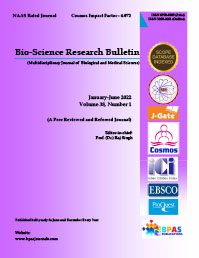The effects of Light Intensity on Seedling Growth of Annona muricata Linn.
DOI:
https://doi.org/10.48165/Keywords:
Annona muricata, Seedlings growth, mesh net, light intensityAbstract
This study was carried out to investigate seedlings growth performance of Annona muricata Linn. as influenced by different light intensities. Seedlings of A. muricata were subjected to three (3) treatments via; growth in direct sunlight (control), in single layered mesh net and in double layered mesh net. Each of the experiment was replicated three (3) times in a Complete Randomized Design (CRD). The variables assessed were plant height, number of leaves, stem girth and leaf area. The data collected were subjected to one way analysis of variance (ANOVA). The results showed that there were significant differences among the treatments at 5% level of probability. Seedlings under direct sunlight had the highest mean height of 13.63cm, number of leaves (17.50cm), stem girth of 1.20cm and had the least leaf area of 11.30cm2 at three month after transplantation. This was followed by the seedlings under single layered mesh net with mean height of 11.05cm, number of leaves (7.00), stem girth (0.78cm) and highest leaf area of 17.06cm2 while the least plant height, number of leaves and stem girth was recorded in seedlings under double layered mesh net with mean values of 10.03cm, 5.83 and 0.68cm respectively. It is concluded that seedlings of Annona muricata under direct sunlight has better growth performance than those under single and double layered mesh net. Though, it had the least leaf area, it recorded the highest mean values in other parameters considered. Therefore, direct sunlight might be required in raising seedlings of this species.
References
Adedoyin T. (2005): Climates and Dune Fixation records of Biological survey.pp27 2. Adelusi, A. A. and Aileme, J. D. (1998). Effects of light and nitrogen limitation on the photosynthesis apparatus and accessory pigment of cowpea (Vigna maniguienlata) Nigeria Journal of Botany 11: 45-51.
Adeoye, I. A. and Onyekwelu, J. C. (2014). Effect of different light intensities on germination and early growth of Parkia biglobosa (Jacq Berth). Proceedings of the 4thBiannual conference of the Forests and Forest Products Society, 23-26 April, pp. 57-65.
Anjah, G. M., Focho, A. D. and Dondjang, J. P. (2013). The effects of sowing depth and light intensity on the germination and early growth of Ricinodendron heudelotii. African Journal of Agricultural Research. 8(46): 5854-5858
Ashton, M. S., Singhakumara, B. M. P. and Gamage, H. K. (2006). Interaction between light and drought affect performance of Asian tropical tree species that have differing topographic affinities. Forest Ecology and Management 221, 42-51.
Bolanle, O.T., Yakubu, F.B., Williams, O.A., Yahaya, D.K. and Asaba, L.O. (2014). Seedling growth performance of Kigelia africana (LAM) BENTH as influenced by light intensities. European Journal of Agriculture and Forestry Research, 2(3):1-13.
Chanhsamone, P., Don, K. L., Silavanh, S., Yeona, D. P., Wai, M. H. and Edwin, A. C. (2012). Effect of light intensities on growth performance, biomass allocation and chlorophyll content of five tropical deciduous seedlings in Lao PDR. Journal of Environmental Science and Management, 1(1): 60-67.
Droppelmann, K. J., Lehmann, J., Eprath, J. E. and Berliner P. R. (2000). Water use efficiency and uptake patterns in a run-off Agroforestry system in an arid environment. Agroforestry System, 49(3): 223-243.
George, Z., George, S., George, K. and Elein, K. (2012). Influence of light intensity on growth and physiological characteristics of common sage (Salvia offinalis). Brazilian Archives of Biology and Technology, 55(1): 89-95.
Gutterman Y. (1994). Strategies of seed dispersal and germination in plants inhabiting deserts. Botanical Review. 60(4): 71-80.
Gyimah R, Nakao T, Oo, M. Z. (2003) Effects of light intensity and nutrient on growth and electron transport rate of tropical trees (Bombax buonopozense, Khaya ivorensis and Cedrela odorata) found in Ghana. Bulletin of the Faculty of Agriclulture, Miyazaki University. 49 (1&2): 69-78.
Manaker, G. H. (1981). Interior Plantscapes: Installation, Maintenance, and Management. Englewood Cliffs, NJ: Prentice Hall Inc. 83 p.
Mendi-Anjah, G. N. (2005). Regeneration studies in the Aguli Forest Reserve, Northwest Cameroon with emphasis on Ricinodendron heudelotii (Bail.) Pierre et Pax. Unpublished Ph.D Thesis, University of Ibadan, Ibadan, Nigeria. 206pp.
Nwoboshi L. C. (1982).Tropical Silviculture, Principles and Techniques, University Press, Ibadan, Nigeria. 333pp.
Olajuyigbe, S. (2015). Effect of shade and drought stress on early growth and biomass accumulation of Tiama Mahogany (Entandrophragma angolense) seedlings. Academic Journal of Science. 04 (01): 27-36.
Otsamo R. Integration of indigenous tree species into fast growing forest plantations on Imperata grasslands in Indonesia. Unpublished Doctoral Thesis, University of Helsinki, Helsinki, Finland. 2000.
Wes, H. (2005). An assessment of biomass feedstock and research opportunities;:A technical assessment report, Stanford University, p13.
